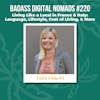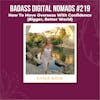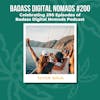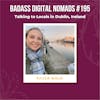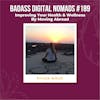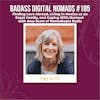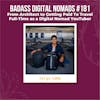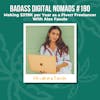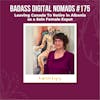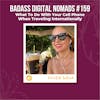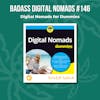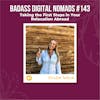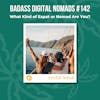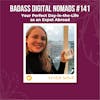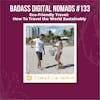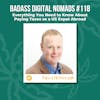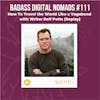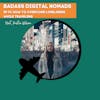Sailing Couple, Ryan and Sophie, on Culture Shock, Mental Health, and Living an Unconventional Lifestyle
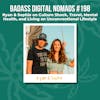
French-American sailing couple, Ryan and Sophie, talk about the struggles and benefits of sailing the world and living an unconventional digital nomad lifestyle. They shine light on why they left their jobs to travel abroad and the challenges of dating in foreign countries.
French-American sailing couple, Ryan and Sophie, talk about the struggles and benefits of sailing the world and living an unconventional digital nomad lifestyle.
They shine light on why they left their jobs and home countries to travel, the challenges of dating someone from a different culture, and their experience buying and fixing up a sailboat to live in. Ryan and Sophie open up about the difficulty of navigating mental health issues amidst the chaos of living and traveling on a boat.
Despite the many challenges of sailing and even a reduction in income from transitioning to this location-independent lifestyle, Ryan and Sophie truly believe they made the right decision.
Curious to know what life is like onboard? Thinking of hitting the high seas? Tune in to see if the sailing nomad lifestyle is right for you!
Episode 198 Special Offers:
NEW YOUTUBE VIDEOS:
EPISODE 198 TOPICS DISCUSSED/WHAT YOU’LL LEARN:
- The story of how Ryan and Sophie met abroad.
- Cultural differences in dating between the US, Sweden, and France.
- Navigating the challenges of dating someone from a different culture.
- The best parts of living in Sweden.
- Working to live vs. Living to work.
- Ryan’s firsthand experience with reverse culture shock as an American expat.
- The biggest reasons why people want to leave the US.
- Things people don’t realize until they travel.
- Why they chose to live on a sailboat & What it’s like to live and travel on a sailboat.
- Strategies they used to transition from regular jobs to remote jobs.
- The chaos and cost of living on a sailboat.
- Things to consider when buying a boat.
- The most and least expensive places to sail.
- Maintaining your mental health while living on the sea.
- Top 3 things you need to do before starting boat life.
QUESTIONS ANSWERED:
- How did you get jobs working abroad in Sweden?
- Where did you choose as a homebase in the world?
- What was your inspiration behind living on a sailboat?
- How did you quit your job before starting to travel?
- Have you been able to maintain your income while traveling full-time?
- How do you care for your mental health during times of chaotic travel?
- Were there any surprises when you bought your boat?
- What is the annual cost of living on a sailboat?
- How many hours per week do you work on the boat?
- What is the best way to get the internet on a boat?
- What underrated travel destination surprised you?
- What is your morning routine living on a sailboat?
- And more!
RESOURCES
Resources for Digital Nomads:
- Sign up for Ryan and Sophie’s course: Sailing The World with Ryan & Sophie
- SafetyWing Travel Insurance
- Wise Bank Account
Books Mentioned:
Related Podcasts:
- Sailing the World With Sailing Ruby Rose
- How To Make Money From a Sailboat With No Experience
- Sailing the World as a Financial Trader and Family Man with Author Patrick Schulte
- Dating as a Digital Nomad - The Good, the Bad, and the Ugly
- Loneliness Living in SE Asia (Part 2)
- 8 Things That Happen When You Travel Full-Time
- Leaving Canada To Retire in Albania as a Solo Female Expat
- Finding Job Opportunities Abroad as an Expat and Online Dating for Travelers with Fairytrail Founder Taige Zhang
- Is It Possible To Fully Integrate With a Foreign Culture?
Related Videos:
- How I See the US After Living Abroad for 15 Years [CULTURE SHOCK]
- What I Dislike About Living Abroad After 20 Years in 60 Countries
- The Downside to Being a Digital Nomad
- How to Live and Work in Iceland
Ryan & Sophie’s Top Sailing Destinations:
- Azores
- Madeira
- Cape Verde
- Bonaire
Connect with Ryan & Sophie:
- Visit their website
- Follow them on Instagram
- Subscribe to their YouTube channel
- Connect with them on Facebook
...........................................................................................
Support the Badass Digital Nomads Podcast:
A special thank you to Kat B for the 5-Star Review and Donation!
Become a Patron for $5/month at Patreon.com/travelingwithkristin
...........................................................................................
Connect with Kristin:
- Follow on Instagram
- Subscribe to Traveling with Kristin on YouTube
- Join the Badass Digital Nomads Facebook Group
- Subscribe to Kristin's weekly travel newsletter
...........................................................................................
Podcast descriptions may contain affiliate links of products and services we use and recommend at no additional cost to you.
Sneak Peek:
Kristin Wilson: 00:00:00 But despite the challenges of sailing and despite the drop in your income, do you think you made the right decision?
Ryan and Sophie: 00:00:07 Yeah, yeah, absolutely. Oh yeah, 100%. I think the way we describe it is that the highs are really, really high, much higher than what you would get in normal land life, but the lows are also very, very low.
Wise:
00:00:20 Sending money worldwide shouldn't cost a fortune. That's why I use Wise. The online account and money transfer app that lets you open balances in 50 different currencies all from one account. Sending money with Wise is eight times cheaper compared to regular banks. And you also save money on the exchange rate. I've been using Wise since 2013 and it's made my business and life so much easier. You can open a new account in seconds by using our referral friend link in the show notes or by going to TravelingwithKristin.com/wise to get your first transfer up to 500 euro free. That's at TravelingwithKristin.com/wise.
Introduction: Welcome to Badass Digital Nomads, where we're pushing the boundaries of remote work and travel, all while staying grounded with a little bit of old-school philosophy, self-development, and business advice from our guests.
Kristin Wilson, host: 00:01:28 Hey there, Kristin, from Traveling with Kristin here, and welcome to episode 198 of Badass Digital Nomads. My guests today are Ryan and Sophie, a French American sailing couple who actually met on Tinder in Sweden. After a few failed relationships dating locals, and shortly after their first date, Ryan texted Sophie with a link to a random article about a couple who dropped everything to sail the world and fast forward, that's exactly what they did. Since 2016, Ryan and Sophie have been sailing the world while documenting their experience on YouTube. In today's episode, we dig into the details of how they got started in this lifestyle and how they stay sane by living and working together on a boat. But really this episode is more about navigating your inner world as much as the outer world. Of course, we're talking tactics and tips and getting insights into things like how they support themselves online and how they learn to sail.
Kristin: 00:02:35 But it's also getting really personal today as they open up about dating mental health and adapting to different cultures, including their own as Ryan shares, how he's been coping with reverse culture shock since moving back to the US and at the end of the episode, they share some of their favorite travel destinations. But first, shout out to Kat Berard who left a new five-star review for Badass Digital Nomads. She wrote: "I love this show so much great info and truths. You can't easily find these details and nuances elsewhere. I love Kristin's honesty and her ability to look at pros and cons and to not sugarcoat things. Her podcast and YouTube videos have been really enlightening and I appreciate her badassness in stepping out there and making the digital nomad lifestyle not just a possibility, but a doable choice that one can make. Grateful." Thank you Kat for that amazing review.
Kristin: 00:03:34 I'm so glad that you're here and coming up on our 200th episode, the best thing that everyone can do to support the show is to leave a review or share at least one episode with one of your friends. Kat was also kind enough to leave a $40 donation on buymeacoffee.com. So thank you so much Kat. Really grateful for that. And you can all support the show by donating on our donation page at badassdigitalnomads.com/donate. We really appreciate the support. Some of the podcasts I've been listening to lately seem to have an ad break like every few minutes and so we really try to keep that at a low with maybe one or two ads per hour or per show. So any support from listeners is super appreciated at badassdigitalnomads.com/donate. And over on the YouTube front, we have some different types of videos that I've never done before, including my first-ever mini-documentary about a destination. And the place I chose is Nosara, Costa Rica because it's such a unique town. There's nowhere like it anywhere else in the country and I know that if you've been there before, you know what I'm talking about. But even if you've been to Costa Rica, I think you'll really like it or if you haven't been to Costa Rica, I think you'll find it to be an interesting story nevertheless. And it's about how Nosara became the wellness and surfing mecca that it is today, but also the dark past and history of how it was formed starting back in the 1960s and some of the problems that are facing it today. So that was a really fun video to make. It took a long time to research and make, but that's a town that I used to live in back in the early two thousands. So that's how it got on my radar to begin with and it's just such a compelling story of how it was created starting with thousands of years ago with the indigenous population through the Spanish conquerors and then through to the present day.
Kristin: 00:05:50 Nosara, it's quite the journey. So you can find that video over on youtube.com/travelingwithkristin as well as a follow-up video to the Dublin Locals video and podcast where I talk to locals in Belfast, Northern Ireland. So we have this balance between the Republic of Ireland, Southern Ireland and Northern Ireland about how people feel about their city, what they like and what they don't like about it and things to do and see if you visit there. We also have a video coming up on the cost of living in Ireland and also a video on high-paying remote jobs because I did a poll and you guys wanted half travel content and half remote work content. So we're trying to keep that balance there. So keep your eyes peeled for those over on Traveling With Kristin. And without further ado, here is my conversation with Ryan and Sophie.
Podcast Interview:
Kristin: Well, welcome Ryan and Sophie to Badass Digital Nomad. So nice to meet you guys. And where are you zooming in from because you have different backgrounds.
Sophie 00:07:03 Well thank you so much Kristin for having us. You are right. We are into different places. Ryan is at the boat, which is currently located in Annapolis in the United States and I am in Paris.
Kristin: 00:07:15 Ooh, lovely. And so why are you in different locations?
Sophie 00:07:19 So I think that uh, we're gonna have opportunities later in this show to uh, go into the details, but essentially Ryan and I are at the very last stages of my green card application and I cannot enter the United States as long as my visa is processing. So my interview is in just a few weeks and while the boat needed to be in a safe place for hurricane season, so we had to take it to the United States, but I cannot go there. So here we are.
Kristin: 00:07:48 We'll have everyone look at those videos cuz I saw a lot of them on your YouTube channel and on Facebook about the green card process. So we'll have people look into that over there. And Sophie, you're French but are you from Paris originally?
Sophie 00:08:02 I am from Brittany but the very last place I lived when I was in France, west Paris, that's where I studied.
Kristin: 00:08:08 Oh, one of my favorite cities. So this is a good opportunity to talk about how you guys met, especially since you're in this green card situation. I read on your website that you met on Tinder back in 2015 and a country that neither of you are from in Sweden. So give us a little bit of backstory on how that all went down.
Sophie 00:08:31 So both Ryan and I moved to Sweden in 2010 for work. We didn't meet for five years and it's really funny because we had a lot of social circles in common and I think that we were both dating Swedes between 2010 and 2015, you know, testing the local waters and we both get out of it a little bit disillusioned. The facade is amazing. You go to Sweden and you have all this amazing pool of beautiful-looking people but culturally it was a little bit of a shock. And in 2015 we were both at the very bottom of our sentimental lives and I went on Tinder and so Ryan is my rebound.
Ryan 00:09:16 It's been a long rebound.
Sophie 00:09:17 Seven and a half years. Yeah, you're a long rebound Ryan <laugh>.
Kristin: 00:09:21 And that's so interesting about how you mentioned the cultural differences because I was going to ask you how did you find those differences from both side, Sophie being French, dating a Swedish guy, and Ryan being from the US dating a Swedish woman. How did you find those experiences? Challenging?
Sophie 00:09:40 Yeah, so I think that we could preface this paragraph by saying that Sweden is an amazing country, right?
Sophie: 00:09:48 We live there for 10 is until now and for another few weeks we're calling Sweden home and we love it there. But Sweden is a very individualistic country where society takes care of the individual and where Ryan and I come from and France and the US, it's kind of the opposite. It's as an individual you will take care of the community and you are more like expected to participate in the community. So we have very strong senses of commitment to the family and I think we still experience a lot of cultural differences between Ryan and I, but that's really what brought us together. It's this sense of commitment to the family and strong community values.
Ryan: 00:10:32 I think Sophie and I had the same experience like dating Swedes, and a lot of our ex-pat friends that lived in Sweden at the same time. We all had very similar experiences. So that was something that drew us together because we had that same experience, you know, even though we were from different countries, that was something that we really had in common at the beginning. And so that was nice. Yeah,
Sophie: 00:10:53 Spill the tea Ryan, spill the tea.
Ryan: 00:10:55 What do you mean?
Kristin: 00:10:57 We need more details <laugh>. Oh yes.
Ryan: 00:10:59 Yeah. Well, I would just highlight what Sophie said, it's very individualistic. So I gotten out of like a three-year relationship with a Swede. It just never felt personal. It felt very like this is just something that we check off the list and I'm not really that committed to you. It's just like oh we need to do this. Like it just never felt right. And then one day my ex said to me, well are we gonna have kids? I'm like, we don't even get this figured out. Like why are we going to that next like part? And so I was just like, this isn't gonna work. So then I was yeah single for about a year and met Sophie on Tinder and there we go. <laugh>,
Sophie: 00:11:35 My ex ghosted me a month after we moved in together <laugh> and like it's, I didn't think that you could ghost somebody while living together but wow he was successful <laugh>.
Sophie: 00:11:47 So this pattern of starting relationships very quickly and also ending them very quickly at the first sign of trouble or disagreements is something that we have seen a lot in our ex-pat circles when it comes to relationships with Sweds. And I really wanna say not everybody's like that. We have a lot of very successful stories, ex-pats being with Sweds, but uh, this was Ryan and I experience and sort of unhealthy bonded over that <laugh>
Ryan: 00:12:14 Not get into too deep in this, but the one thing I always tell people is like, this is how I see the difference between Swedish dating is like first what they'll do is they'll go to a party and get drunk and then they might go home together and then they'll do that again and then eventually they get up the courage to like go on a date and then they might go to a coffee shop or something and then you know from that they'll date for a little while and then maybe they move in together, that's the next thing. And then they get a dog to see how that works.
Sophie: 00:12:41 Yeah, they'll get the baby first.
Ryan: 00:12:44 No, Dog and the baby. Yes, So then they'll get a baby and they'll see how that works and then they might get a second baby and see how that works and then then it will transition into maybe getting married at some point or they don't and then they just break up <laugh>. So that's how it works.
Sophie: 00:13:00 <laugh>.
Kristin: 00:13:01 Oh my gosh, that's so interesting.
Sophie: 00:13:02 Which is okay.
Kristin: 00:13:04 I haven't spent that much time there but I think when I was there I had a boyfriend so I didn't date anyone when I was there. You know, you have cultural differences everywhere and so I'm so fascinated by this topic because dating is very complex. Relationships are complex, people are complex. And so it's not that you know one way is better than the other. It's just when you come from a country you're used to a certain kind of general average cultural expectations and values and then there's a learning curve when you go to another place and that happens whether you're dating or not. But if you are dating then it's like another thing. And sometimes I found that people find it easier, like they leave their home country, they get to another place and they're like, oh my gosh, finally my people like I totally get these people, these are the people that I wanna date and whatever. And then sometimes it's the other way around and sometimes it's somewhere in the middle. And I'm sure that a lot of people choose countries to go to based on their dating preferences. And it's definitely been a factor for me too. Like I don't know, you just kind of vibe with a certain type of people. But I had found it a little bit challenging when I was in Norway, which is different culture than Sweden but kind of like you know, northern Europe
Sophie: 00:14:28 Kind of the same.
Kristin: 00:14:30 Yeah <laugh> I was kind of expecting like I'm like oh well these were the Vikings, like maybe chivalry is really alive in Norway but I found it quite the other way around. It was like the women, maybe it's because of all of the equality in the society and the socialist society, like the women need to make the move.
Sophie: 00:14:48 Yes.
Kristin: 00:14:49 Yeah. And so I felt like the men were very respectful almost to a fault where like they didn't even wanna talk to you like they did, they were interested but they were just like waiting for you to do everything. And so I felt like that was challenging for me. Yeah.
Sophie: 00:15:07 Exactly. That's pretty much the same in Sweden.
Kristin: 00:15:10 Okay. <laugh> <laugh>, maybe I won't date there. And then when you met your significant others who were locals, did you meet them through work or why were you living there for so long outside of your home countries?
Ryan: 00:15:23 I moved there for a job as Sophie said, and I only really planned to stay maybe for a couple years. I ended up just loving Stockholm. I mean I've traveled all over the world and I think it's one of the coolest cities in Europe, if not the entire planet. Like it's just a cool place to live and it's easy and everything works and it's clean. So I ended up just saying like I love this place, there's no reason for me to go anywhere else. You know, I can travel other places. And so that was really the reason I stayed. I bought an apartment there and it just worked, you know? And I liked my friends and so there's not much more to it really than that. I just liked it. <laugh>.
Sophie: 00:16:01 Yeah, everybody sort of moves there either for a job or for love and when you move there for a job, you stay for the quality of life. Want to experience the Swedish way of of living, it's hard to go back. When I moved there I would live for work so I was very car--career driven, I really wanted to be successful and when I moved to Sweden I realized that I didn't have to do that. I could work to have a good life and I could still be successful and it makes such a huge difference in in everything you know? So it's very difficult to leave that.
Ryan: 00:16:40 Yeah
Kristin: 00:16:41 That's fascinating coming from France where people, I think especially being American and we kind of see it as you guys are really enjoying your lifestyle. So it's really interesting that you would have that perspective and that kind of pressure in your job, be it perceived or real in France and then find respite from that in Sweden, which is a country that we think of as like more economically inclined but people do really like to enjoy their lives there. Also, I wish I was there in the summer because when I was there everyone was talking about the islands and all of the parties and the weather is so nice and everything. So I could see
Ryan: 00:17:25 Summer's great in Sweden. I think what you just described is something both Sophie and I experienced like this work-to-live, live-to-work kind of concept and that was probably something else that we shared. Like we mentioned at the beginning, we're going through this green card process for Sophie and there's a long explanation why but we're gonna have to live in the United States for a while. So when I brought the boat back recently it hit me like I'm moving back to the United States, a place I haven't lived in a very long time and I visited and seen family and stuff but it was like I'm going through this bit of a reverse culture shock thing, you know, it's like it's my home. I lived here for a long time but it's not what I was used to 10 years ago and I'm still processing that as we go along and I'm not quite sure how I feel about it <laugh>, but is a very interesting thing that's going on with me at the moment.
Kristin: 00:18:13 Where were you from originally in the US?
Ryan: 00:18:15 I'm from the sailing Mecca, Des Moines, Iowa, right in the middle of the country. It's uh, a lot of sailboats there. <laugh>
Kristin: 00:18:22 And now you're in Annapolis.
Ryan: 00:18:24 Annapolis, Maryland, yeah just outside of DC
Kristin: 00:18:27 Do you guys know where you will have a home base once Sophie gets her green card?
Sophie: 00:18:32 Probably in the Annapolis, Maryland.
Ryan: 00:18:34 Yeah, I think along the coast here so we can be close to the boat.
Kristin: 00:18:37 Is that a good place to dock your boat or why did you choose there?
Sophie: 00:18:41 I think that they were a lot of factors. The first one was that we wanted to be close to an international airport because we travel a lot, we're not gonna be there a lot. And the second one was because Annapolis is the sailing mecca of the United States and it felt like a place where we'd have some community already which is very important to Ryan and I, full disclosure, I've never been there <laugh> so it will be a bit of a surprise in a few weeks but we're excited.
Kristin: 00:19:10 Ryan, what are some of the things you've experienced on the lines of reverse culture shock? Because I've definitely been there too and I think a lot of people who've lived abroad have experienced that whether they come back to the US or somewhere else but the US in particular because it can be quite a polarizing place.
Ryan: 00:19:28 Yeah, well first off, living abroad as you probably know really opens your eyes to a lot of different things and different views, especially this year for a lot of reasons. I've just changed my view on the world so much and it's something that would not have happened if I was sitting in Des Moines, Iowa. Just getting out and seeing other cultures and seeing how people work and realizing like we all just want a good life. Every person on the planet just wants a good life and we all get there kind of different ways. But I sold my car, I lived in DC for a year before I moved to Sweden and I sold my car when I moved to DC and that was the best thing in my life. Stockholm has a really good mass transit system and that's like the first thing I have to drive everywhere here.
Ryan: 00:20:11 Even like living on the east coast, there's trains and buses and stuff but it's not like it is in Europe so it's like okay we gotta get a car <laugh> to do everything that sucks just like portion sizes and food sizes. It's like this is way too much. I don't need like the big gulp, <laugh> coke, that's like unlimited refills, you know just like things like that and the, this is I think just a general thing and going on in the world now but like politically things are like so polarizing with people. You can't talk to anybody anymore about things that people disagree with and I felt like in Europe there was a little bit more, maybe I'm being naive about this, a little bit more open-mindedness to having like actual discussions about things versus just fighting. So it's all these things I think <laugh>.
Kristin: 00:20:57 Yeah, I think one of the things that people say to me the most on the phone when we're talking about relocating to other countries cuz I help people move abroad and one of the biggest reasons that people want to move, well now it's the inflation and cost of living but above all of that it's just the animosity in the people and like the sides of the political arena no matter what side you're on, I think people have a a negative view over the situation and it just kind of becomes irritating. Yeah to live around that And it's hard to tune it out when you're here cuz like you wanna be an informed citizen but you also don't wanna jump into the negative downward spiral of doom when like you know that there is no solution that's gonna come out of it, it's just gonna be butting heads like indefinitely. So I don't know what the solution is to the US political,
Sophie: 00:21:53 There is something to be said about that which is the situation is or the atmosphere is very inflamed in the US at the moment and we don't have the same points. The wounds that get inflamed after a while in in Europe not as much. So I can relate to that.
Kristin: 00:22:11 Yeah and I'm also curious, this is like a totally different topic of sort of related, but coming from France and having lived in Sweden and having traveled around the world, one of the big things that I noticed when I came back to the US and I've talked about this in videos, is how tasteless the food is to me. Like I miss so much the food in Europe, like the flavor of everything like produce fruits and vegetables. If you just get like a plate of pasta or a burger at Chili's or Applebee's or something like any of the chain restaurants, I mean it's night and day. It's so disappointing.
Sophie: 00:22:49 I know, you know it's funny because we've crossed the Atlantic three times. So we've been from Europe to the Caribbean and then back to Europe and then back to Caribbean and uh US and one of my favorite thing that happened when we went back from the North America Caribbean side of the Atlantic to Europe was the food was going to the market, going to the supermarkets, going to the restaurants, even going to the restaurant in Europe is such a much different experience than on the other side of the Atlantic. And before I moved abroad I never really understood why the French had such a reputation for food. And then I went, I started going to restaurants and I'm like wait, I can cook this myself better. Yeah. And so I realized that when we go out in France we expect to go eat something that we would not cook ourselves. Something a little bit exceptional and it's relatively affordable but when you go elsewhere you go out and it's just not the same experience <laugh>
Kristin: 00:23:55 No. And I was complaining to my mom that I went to get a bagel and it was $8 in Miami for a bagel and cream cheese and it was just a regular bagel. You know, it wasn't a chocolate croissant <laugh> that you would get in Paris that would cost maybe one or two euro or something.
Sophie: 00:24:15 Oh yeah, two euros is expensive for a question.
Kristin: 00:24:17 Yeah, it's like the value or the lack of value for money and then the lower quality of the products that just leads me to cook at home all the time because I'm like I can't get anything better if I go out to eat unless you spend really a lot of money like a hundred dollars or more and unless you have some lo local place that you can find those local gems too. But I can still remember yeah just even going to a cafe or something. Of course in Stockholm in Sweden you have the Fika culture which became a thing on social media. So can you summarize what Fika means to you?
Sophie: 00:24:54 It's funny, you know because Fika is the Swedish word to describe having coffee and cake or tea and cake or just a coffee break in the middle of the day. So one morning and one in the afternoon. But if you go around the world, you know a lot of cultures have the same concept. We have it in France, we call it goûter and I think that in the US we call it snacks,
Kristin: 00:25:17 Snack time
Sophie: 00:25:18 you know, it's just this break that you have in between meals. But in Sweden you would particularly associate it with some nice filtered coffee and cinnamon bun which we call cannelle moulue and it's the best thing ever.
Ryan: 00:25:33 It's pretty serious though. I mean people will just, like everyone will stand up from their desk and just stop working and I'll go hang out in the cafe for Fika, you know, you do it with your friends like a little rainy Saturday afternoon, just meet up at the coffee shop. It's just super nice and it's relaxing and hang out and talk and that I think is another thing. Uh, Sophie I know has a little bit of that culture in France where it's like this just ad hoc meetup at the cafe or at the restaurant. And I think that that's one thing we're gonna struggle with a bit in the US is because you know, we do have to drive everywhere. We do have to kind of plan things out that it, it's not gonna be as ad hoc <laugh>, but I just wanted to like make a comment back going back to what you, we were talking about traveling and food and I think that's, you guys are just highlighting a reason that travel is so important and that's because most people don't know what they don't know. So like you hear how good the pizza is in Italy and when we got to Italy and actually had a pizza, I was like oh my god, <laugh> this is not dominoes. <laugh>,
Sophie: 00:26:41 I never had a pizza before.
Ryan: 00:26:42 This is amazing. You know what, I didn't know that. And it goes with everything, culture, politics, technology you think you know, but you have no idea until you start traveling. And I just think that that highlights why people need to do it more.
Kristin: 00:26:57 Yeah, definitely. I can still remember the first bite of food that I ever had on European soil and it was a panini with mozzarella, you know, arugula, tomato prosciutto in Rome and I was 17 years old and I was with my mom and I can just remember holding the panini in my hands and being in this little cafe and being like, I didn't know that bread could taste so good. And I don't know, it's it's true you, you don't remember the sub that you got at Subway when you were 16 years old on the way to high school or whatever <laugh>. But you remember that and so yeah, that that's a big thing.
Sophie 00:27:38 Yeah it's because US bread is just not bread <laugh>.
Kristin: 00:27:42 No, I saw in the CVS pharmacy yesterday I was picking up some photos and they had a display and it said European pastries or European baked goods and it was just like packaged plastic, different types of breads and croissants and I looked at the ingredients of everything and I was like there's no way <laugh> like I'm not eating this and this is not a German bakery, this is a CVS display case filled with plastic croissants And it was very sad but what Ryan said about the culture and like Fika culture in different places, that's so true also because as you guys were talking about that it reminded me of when I lived in Nicaragua we didn't have the cinnamon rolls but we had like a banana bread break <laugh> where we would come in from surfing and we would have coffee and banana bread for example.
Kristin: 00:28:37 And that was so fun and it's just like a communal activity where everyone would just sit around and like talk about the waves and eat our banana bread and, and when I lived in Iceland my roommate or my flatmate, she was from Finland and she would make homemade cinnamon rolls in our house. And so I can just picture these rainy like gloomy cold days and we're just drinking coffee and eating cinnamon rolls and it's the little things you know, so that's really nice. I hope we can get some more Fika in our lives. Yeah. But going back to what Ryan was saying about travel Ryan, what led you to leave the US to begin with? It sounds like you just left more than 10 years ago and went by yourself to Sweden. What were those conditions? Were you working for yourself, you already had your company or what led you to leave the exotic location of Des Moines, Iowa?
Ryan: 00:29:35 Yeah, I was living in DC at the time and I just got a job offer and before that, a couple years before for work I was traveling internationally a lot. I was pretty young to be doing that. I was probably like 26 or 27, I was traveling all over the world and I had met this company in Stockholm through my travels and work and got to know the guys and they had offered me a job before and I said no. And eventually they offered it again to me and I just told myself like this is an opportunity that not many people get to like move abroad, have the opportunity to work abroad and so I should just take it and if what's the worst that's gonna happen, I don't like it and I can just pack my stuff. I think I had four boxes and three suitcases that I moved with and I can just move my stuff back and start over. I'm young enough, I don't care. And it was the best decision in my life to do it. It really was. And so yeah, I kind of tell everybody if you have the chance to go live abroad you should cuz it's just really interesting <laugh>. Yeah
Kristin: 00:30:34 You'll, you'll just never be the same again.
Ryan: 00:30:37 Yeah, yeah. It comes with its own stresses. It's not always easy just like us living on a boat always isn't easy but it just is worth it.
Kristin: 00:30:46 Totally. Well let's get into the boat life. So you guys are living together or you're hanging out in Stockholm, you're dating then Ryan has this brilliant idea like what if we just dropped everything and lived on a boat? You found some article online about a couple who decided to quit their job, sail the world. So yeah, what was the inspiration behind that? Because it sounds like you were living a pretty good lives in Sweden.
Ryan: 00:31:19 Yeah, I mean we were living good lives. It, it's also probably worth prefacing that I think I had just met Sophie like a month or two before I got this idea. So we were like brand new. I was Sophie's rebound brand new into this and yeah, I mean I think both of us were a bit
Sophie: 00:31:36 Disillusioned.
Ryan: 00:31:37 Yeah we're just like a bit unsatisfied. Like Stockholm was great, friends were great but we were still doing the nine to five go to work like is this all life is even though we're in a foreign place and it's nice. But we remember we'd been there a while and so it just came up like sailboat that's cheap. You just buy the boat and the wind takes you everywhere and we can just anchor and we can live a cheap life and it's gonna be awesome. You know curse as we've gone on we've learned that none of that is real. <laugh> <laugh>, that was all a big illusion <laugh>. So I just texted Sophie is like, Hey I just read this awesome article, would this interest you? And she had a pretty positive reaction I think less than a year later we had taken sailing lessons and we bought the boat that I'm sitting on today, Polar Seal. So yeah it all happened fast <laugh>
Kristin: 00:32:25 Amazing. And then how did you transfer out of your job? So did you, in that year leading up to your departure date, did you start side hustles or did you just flat out quit or did you wait and save money until the end of the year and then quit? What was your strategy?
Sophie: 00:32:44 Yeah, so it was not a sharp cut, it was not uh, one day to the next. It was definitely a process. And I think that one of the reasons why we decided to pursue this uh, sailing dream was because neither Ryan or I were particularly satisfied with our jobs. To put it mildly, I was very much ready for a change. So Ryan quit his job quickly though I will say that after you handed your uh resignation, you stayed for a year.
Ryan: 00:33:15 I just kept showing up. They kept paying me. So <laugh> <laugh>, that's another story <laugh>,
Sophie: 00:33:22 I actually found another job that paid more and I thought that I would be having a little bit of an easier time and after a year I just didn't turn that way. I had the exact same frustration. So I quit, I started my own activity and at that time I was doing social media marketing. Ryan, you had started your consultancy business. you were doing consultancy in aviation and uh, pretty quickly we realized that you know, we were never gonna have it completely figured out financially or in terms of the work and you never really do before you leave. So yeah, we took the plunge, we decided that uh, 2018 was a good year for us to go and I'm glad we did. We had a little bit of money saved up and you know, our professional situations have changed a lot since then.
Ryan: 00:34:10 I think it went through a couple iterations too. Like we originally looked at this and were like okay, we're going to do this sailing thing for a year. We're just gonna do an Atlantic loop. And then the more we kind of got into it, the more we realized like we didn't really like our jobs as Sophie said, and we're like maybe this is an opportunity to like kind of free ourselves from that. So this gets into a bit of the culture bit from Sweden. You know, quitting your job is a big thing, right? It's like not the standard societal thing to do, but Sweden has a lot of good programs to help entrepreneurs build up a business. So both Sophie and I got involved with those programs which gave us a little bit of a safety net as we were kind of transitioning our jobs while also transitioning into this like boat life <laugh>.
Ryan: 00:34:56 And then you know, as we left to go sailing, I think we both went through a few rounds of, you know, I was consulting at first and then I started doing something else and now I'm working for a company that I helped found back in 2008 and it's just gone through like this transition. Sophie is doing the same as well with you know, what works and what doesn't work. I think we were just really fortunate to have good jobs before we left and we saved up. You know, we had a little bit of a backstop and yeah, it's just been a self-discovery of how we can make it work working from a boat.
Kristin: 00:35:31 Have you been able to maintain your income or has it fluctuated?
Sophie: 00:35:36 Oh it's been very much going up and down <laugh>.
Ryan: 00:35:39 Yeah, that's a hard question. We had really good jobs before we left per Swedish standards so it was hard to like get back to that level. And we've been out now Sophie for a little over four years and sailing on the boat. I would say just now we're starting to get slowly back up to those levels that we were at. Yeah. <laugh>.
Sophie: 00:36:02 I am not there.
Ryan: 00:36:03 No, not there yet.
Sophie: 00:36:03 I am not there.
Kristin: 00:36:05 <laugh>. But despite the challenges of sailing and despite the drop in your income, do you think you made the right decision?
Ryan: 00:36:12 Yeah, yeah
Sophie: 00:36:14 Absolutely. Oh yeah, 100%. You know, there is having money and money can buy you a little bit of freedom of choice, but at the end of the day you're gonna have to live in one place and go to the office and go to work. And if you have the possibility to work remotely, maybe you are a little bit freer. But our life is rich of experience so we don't have the same amount of money that we used to do, but we live a life that has truly enriched us as human beings and I would never go back if we had had a regret at this point. You know, it's been over four years we would've gotten back to work or to employment.
Ryan: 00:36:53 I think if you add up the experiences that we've had and the people that we meet and you try to put a dollar value on that, it's gonna be impossible. Like you know, there's just things that we see living on the boat and there's people that we meet living on the boat. How would you ever have those same experiences by paying somebody to give you those, I don't know how you would ever quantify that. So that's not to say it's not hard and there's plenty of times we call them sell the boat days <laugh> where we're like this is going, we're done with this.
Sophie: 00:37:23 We're not sailing, we're selling. Yeah,
Ryan: 00:37:25 Yeah. Sometimes we have multiples sell the boat days in one day that's when you know it's gone really bad. So it's not always easy. Sometimes we think we're crazy but you just can't quantify the experiences that we've had. It's been amazing.
Kristin: 00:37:40 Yeah, I saw your t-shirt that was like hashtag the fucking <laugh> where it's like the anxiety of things going so well on the boat that you're like waiting for the other shoe to drop.
Ryan: 00:37:52 It just happens. It's Murphy's lawn and that's like one of the problems with sailing is that sometimes you're just so tired and you have some work to do. You have some boat work to do, you've just done a long sail, you just wanna sleep, you're on anchor. And then in the middle of the night a storm bruise up and it's like blowing and you know you gotta get up and deal with it. You're in your underwear on the deck at three in the morning trying to like, I just wanna sleep <laugh>. You know? Then you have other nights that are just fantastic. And so I think the way we describe it is that the highs are really, really high, much higher than what you'd get in normal land life but the lows are also very, very low. Much lower than what you'd get on land life <laugh>. So
Kristin: 00:38:33 Have you guys ever heard of the book “Two Years Before The Mast”? No, no. It's such a rogue book that one of my subscribers recommended to me and it's about this guy who sailed, he was in bad health in the 18 hundreds and so his family or his doctors recommended that he go on a boat and sail to California, which this was before the Panama Canal was built. So he had to go all the way around Cape Horn and he was like a Harvard-educated kind of student sort of guy, like not a sailor, not very physically active. And so yeah he got thrown into this situation where he goes all the way to California and then back and he gets stuck there for a while because it was supposed to be one year, it turns into two years. I won't give it all away but we'll drop the link in the show notes.
Kristin: 00:39:24 But one of the things that I noticed when I was reading that book was how difficult sailing is, especially back in the 18 hundreds, right? It was even worse back then but I happened to be reading this book at the same time that I was writing my first book, Digital Nomads for Dummies. And it was this very weird parallel universe where all of the internal and external turmoil that I was experiencing and the challenge of writing a book in such a short amount of time was kind of lined up with what he was writing about in the book with like all the hardships that he was experiencing with sailing. And it gave me this sense of gratitude that my hardships were not as hard as his like I was kind of living through his this like very visceral reality of this book and everything that they were going through.
Kristin: 00:40:19 And then we kind of came out of it at the same time. Like this sounds so weird to say all, but like as I was getting over the hump of writing the book and things were getting easier, we were getting through the editing process, like coming to conclusion of the book writing process. He was coming out of the bad weather around winter in Cape Horn, which is the tip of Patagonia, south America, the Arctic. And they were getting into like crossing the equator and getting into warmer weather and it was kind of like smooth sailing and it was just really weird that like every day, like even the date that I would be reading the book was the same date of his journal entry in the book but like from 1836. So it was super weird. Anyway, the point of this was that he was reflecting when he got back to Boston on how difficult the journey was but also how quickly you forget about the hard days because you also see the beauty and even though this iceberg could kill you guys and sink the ship, it's also such a beautiful iceberg and even though you're doing this horrible manual labor on the boat, you're doing it with the other sailors and there's this camaraderie and this community there and he was like talking about how he kind of felt like weird or almost guilty to be in the Caribbean where it's like beautiful weather and sunsets and there were no hurricanes or anything, you know it was just like nice calm, smooth sailing so to speak.
Kristin: 00:41:57 And they had just come from this like life or death situation where they didn't think that they would make it. Is that kind of how it feels in your sailing journey where like you have these days like three sail the boat days in one and you're just at your wit's end and you're three in the morning and your underwear on the deck. But then like two days later you have this amazing experience and it just makes it all worth it.
Sophie: 00:42:22 Oh Yeah. Yeah. One of our favorite stories to tell is how one day we were leaving a tiny little archipelago of islands south of Guadalupe called Les Saintes and this was the second time that we were trying to leave. The first time the conditions were so bad that we had to turn back, we couldn't do it. And so we tried again a couple of days later the weather was still not great and we still had a really really rough time and we were battling for hours and then all of a sudden there is this giant whale that breaches at a safe distance from us and it was this amazing show and you know, we were seasick and not in the best of mood but within half a second I'm like oh my goodness, this is incredible. And then we went back to dealing with the the really terrible conditions <laugh>.
Sophie: 00:43:13 And it's more than a rollercoaster because you go from zero to a hundred in very short amount of time and this carries through the rest of our lives and other areas of our lives as well. So right now Ryan and I are in this big transition phase where the boat is somewhere because we have to escape hurricane season. Our lives have been a bit chaotic in the last two months. We've had to do a lot of rearrangement, we've had a few setbacks and I was having a bit of a check-in with myself, I was like I don't feel like I'm dealing with this great. And then I had to remember everything that we had been going through for the last two months and realized that we've actually had a lot of setback and I'm actually dealing with all of this pretty great. So all of this has really worked out the resilience muscle
Ryan: 00:44:02 <laugh>, Sophie and I are pretty open about this but we see a couple's counselor and we have since we left and it, it's been really great for us in our process and stuff. But we had to kind of train our couple's counselor cuz she deals with land people, not see people <laugh>. So we kind of have trained her like what our life is and I think at first she thought we were just crazy and the more we got into this, I think more than once when we would talk to her cause we'd tell her everything going on, she'd just stop and be like guys you need to step back and realize there is a lot going on right now. <laugh> sometimes took that outside perspective because you know we have the boat to deal with which is its own rollercoaster and then we have our businesses and then we have just trying to have a relationship as well And I think it's very easy to lose sight of that because you're in it all the time. And so yeah it was helpful sometimes for her just to say guys, you just need to like take a step back and realize there's a lot going on <laugh> and the stress is probably normal.
Kristin: 00:44:58 Yeah because you get acclimated to it and then this level of intensity and activity just becomes your new normal. And so I think that's part of actually the reverse culture shock that I experienced when I first came back to the US was some of the problems that my new friends were coming to me with. I was like caught off guard because I would have those problems. I wouldn't even mention it to anyone cuz like there's way bigger problems going on when you're traveling and running your own business. And so even though I haven't sailed I can definitely relate to that kind of, it's like a muscle that you build but then you don't realize that it is affecting you. Like you might ignore 90% of the problems and then that last 10% is like really getting to you. But then to your counselor, she might need counseling now after hearing all these things, you know, she's like how are you dealing with this? Like she can't even fathom the stress that you're under in this situation. But you haven't sold the boat yet?
Ryan: 00:46:03 No we haven't. No, that's true <laugh>.
Sophie: 00:46:06 And I think that if we were to sell the boat it would be to buy a new one. <laugh>.
Ryan: 00:46:10 Yeah.
Kristin: 00:46:11 Yeah. Well let's talk about the cost of the boat. So you still have the same boat that you started out with. I saw in one of your videos that the sticker price of the boat is not necessarily accurate like the cost of the boat. Can you explain to that a little bit?
Sophie: 00:46:28 That's correct. So when you buy a boat, there is the price at which you buy the boat, but a lot of times you will find that boats that have been for sale for a little while or when the owner has had the idea to sell the boat for a little while, the boat is not up to notch when it comes to the maintenance. So whatever boat it is that you're buying there is going to be maintenance that needs to be done right away. And a lot of times owners will sell their boat right as big ticket items come to an expiration date. So that can be the rigging, which for boat like ours runs $10,000. It can be the engine, same thing about $10,000. So you have to be really careful when you buy the boat you see a price tag, but you're gonna have to spend a lot more to get the boat ready to sail, especially if you're trying to buy a boat to do what we do, which is to sail the world and go long distance sailing.
Sophie: 00:47:27 The other thing that happens is that the boat may not have all of the equipment that you want or you find out later on that you need a very specific type of equipment. And that can also run very expensive between buying the equipment, getting the installation done, being at a place where you can get that installation down. So we typically say, and we've done a huge lesson on how to budget for a selling adventure because we've created a course now for people who want to get started in this life and know nothing about boats. But we estimate that when you buy a boat keep 30% of the budget for maintenance and upgrade and you will be very happy that you've done that.
Kristin: 00:48:12 What were some of the big ticket items that you had to replace when you bought your boat?
Ryan: 00:48:17 Well so we did the rigging as Sophie said. I think that was about, at the time it was about $8,000 and then we replaced all the canvas, all the covers and stuff kind of for out in the cockpit. So keep the sun off of us and keep the rain off of us. That was about 10 grand. And then we've just done a lot of upgrades I'd say. So the boat's in pretty good shape. Most of the stuff we've done to it has been to make our lives more comfortable as we've been living on the boats we've upgraded like the power supply and all the charging systems. So we've added solar panels and lithium batteries and all kinds of stuff and it just makes living on board easier and more comfortable. I think this year we'd spend about 15 to 20 grand this year and just like doing things the boat.
Sophie: 00:49:02 So we bought our boat in 2016, six years later we've probably spent as much as what the boat cost us initially, which was $90,000 Ryan? Yeah.
Ryan: 00:49:13 Yeah, It's about 90,000
Sophie: 00:49:15 <laugh>, but we've probably spent the same amount if not more, on maintenance, upgrade replacement repairs. So
Ryan: 00:49:25 It's always good to stress this and I think Sophie and I always say this is like it costs what you have. I have a friend of ours, never met him, he's an Instagram friend, we have many of those in this life and he bought his boat for 5,000 bucks, fixed it up, worked weekends, worked odd jobs to try to get it going and he left California, went to Hawaii and now he's in French Polynesia sailing around and it's cost him something different. It's cost him some of his social scene cuz he is had to work more. It's cost him, you know, he does odds and jobs. So, and then we have friends on the other side of the spectrum that have multi-million dollar boats and they have all the work farmed out, you know, and have professionals come in and do the work. Whereas Sophie and I do all the work on the boat ourselves. So it costs what it costs. And we've met, you know, people from all sides of the spectrum. What I would say we have is kind of in the middle of the road type of setup.
Kristin: 00:50:20 Was there anything that wasn't disclosed when you bought the boat? Like were there any big surprises or was the owner pretty straightforward about, you know, these are the big investments that you'll need to make?
Sophie: 00:50:30 It was a bit sad because the owner of the boat had actually passed away. Oh. And that is how the boat ended up being for sale. But we were very lucky and found a broker who was amazing, a fantastic person to work with and everything was very transparent. The boat was in great shape and the owner had documented absolutely everything and kept everything. So to this day we have records of the boat being ordered, everything that was added to the boat. And we were very, very lucky because we had no idea what we were doing at that time. We had just learned to sail and we've met a lot of people for whom the experience was completely different. And they did buy a boat that turned out to be much worse shape than what was sold to them.
Kristin: 00:51:18 Okay. So look for the boat records, get a good broker.
Sophie: 00:51:23 Look for a good owner.
Kristin: 00:51:25 Good owner <laugh>.
Ryan: 00:51:26 Sophie has a good quote regarding this. I'll let you say it, Sophie.
Sophie: 00:51:29 Oh yeah. It's like when you buy a boat, you buy the former owner in, it's a package deal. You're gonna buy the owner's habits when it comes to maintenance and repairs. You're gonna buy their skills. You're also gonna buy the type of contact that you can get with the former owner. Like if you have a bad relationship with the former owner, it's not a good thing. You wanna have a good relationship with that person because you wanna be able sometimes to call them.
Kristin: 00:51:54 Ask questions. Yeah.
Sophie: 00:51:57 When you buy a boat you buy the former owner.
Kristin: 00:51:59 It's kind of like with a car, like when I lived in Costa Rica, I realized that a lot of cars that are totaled or that get sunk in the water or something really bad happens to them, get exported to other countries and then the history of the car has a gap in it. Maybe the mileage is turned back. Like they do all sorts of things to cover up what's wrong with the car. And then you don't realize that you bought a lemon, this used car that's been in all these wrecks and stuff. So it's kind of like buying a car, but just the stakes are higher cuz it's a boat and you're floating on the water. So what are some of the things that, you know, maybe you're halfway across the Atlantic Ocean and you're like, ah, I wish we had this on the boat. Does anything stick out to you?
Ryan: 00:52:46 It always changes based on where we are. I'd say <laugh>,
Sophie: 00:52:50 Yes, it really does. So we've been doing a lot of tropical sailing lately and we really wish we had AC
Ryan: 00:52:58 Oh Indianapolis here. It's so humid. I wish I had AC. It's not so bad on Anchor cuz the wind always blows into the boat. But when you're in a marina it's just horrible.
Sophie: 00:53:08 Hmm.
Ryan: 00:53:09 I think the funniest thing was a few years ago, Sophie and I had talked about getting a washing machine, like a closed washing machine on the boat and I was really dragging my feet cuz we just don't have a lot of space for stuff like that. And we were in Bon Air for about four months. The laundry is like a mile walk from where the dinghy dock was. And this one day I had walked all the way to the laundry, it was closed and I had these huge bags. But then the opening time was like 45 minutes later, an hour later. So by the time I would've walked back and then walked back again. You know what I mean? So I was like, oh, so I'm just gonna wait here for an hour. I was so, I was just, and it was hot and humid, you know, <laugh>, I was so frustrated. So when I got back to the boat, I was like, we're gonna get the washing machine now. <laugh>. We had a washing machine brought down by some friends and like I think in like three weeks we had a washing machine and stuff.
Kristin: 00:54:00 <laugh>. Yeah.
Sophie: 00:54:03 And it was the best thing ever.
Ryan: 00:54:05 Yeah, it's been great.
Kristin: 00:54:06 Sophie looks so happy. Yeah, I know that the heat and those marinas and port sometimes, especially in the Caribbean, it's just sweltering. Yeah. And I wouldn't be able to be hiking up a hill with my laundry, that's for sure. <laugh>. Yeah. Um, yeah, it's those little day-to-day things that can be really annoying. And you have like the last straw, I guess a two-part question. What would you say like your annual cost of living is on the boat and does it really vary a lot by the destinations that you go to? Or is it kind of like this is the cost on the boat, it kind of averages out or can you like save money by sailing to a certain place?
Sophie: 00:54:44 So the answer is the same to both questions. It really depends. Our income has really fluctuated in the last four years. I would say. We're finally starting to get to a bit more stable place run, especially me a lot less. But we estimate that we live on $3,500 a month. What do you think Ryan? That's about what we estimated that we, we could
Ryan: 00:55:08 Yeah think do have a bit more income coming in now and we're using all that but we're in this like weird life transition thing. But generally, yeah. And I would say like to answer your other question, like definitely there's much cheaper places than other places. So a good comparison was I just sailed from Bermuda and Bermuda is an awesome place. If you ever get the chance to go to Bermuda, it's great. It's not far from the US but it is terribly expensive.
Sophie: 00:55:35 Like you were talking about your $8 bagel, I had a coffee and a yogurt for $22.
Ryan: 00:55:42 It's terrible. I know we went, there was three of us that went to breakfast one morning we got orange juice, coffee and some toast and I think it cost $90 so it's just ridiculously expensive. But it's a beautiful place and it's so protected there with our boat that we lived on anchor the whole time. So we didn't have any other costs than just going out to eat or getting you know, food at the grocery store. So it kind of balanced a little bit I would say there. But on the flip side, like we've been in ridiculously cheap places like the Azores or anywhere in Portugal really is just ridiculously cheap and the food's great, but the marinas maybe aren't always so good. So we find that like most places we go, it can't average out in a way because one thing might be expensive and something else isn't. But there are definitely cheaper places than others.
Kristin: 00:56:32 Do the like docking fees change a lot from place to place too?
Sophie: 00:56:37 Yeah.
Ryan: 00:56:38 Yeah. And time of year as well. Yeah.
Sophie: 00:56:40 So in Spain in the winter we could dock polo seal, which is a 40 foot sailboat for seven euros a day I think. And lately we had to go to the marina in Bermuda to finish filming our course and it was $160 a night.
Kristin: 00:56:58 So it's like camping or a hotel, like the rates vary.
Ryan: 00:57:03 Yeah. But you don't get anything else with that. Like you get a piece of wood to tie your boat too and you get a shower to use and that's it. <laugh>
Kristin: 00:57:09 A parking fee basically. Yeah. In Monaco it's gonna be a little bit different. <laugh>.
Ryan: 00:57:14 Yeah.
Kristin: 00:57:14 Than, or maybe in Cannes or something in France than Mexico. And so when we're talking about the costs, like okay we're looking at the paper costs, but as you know there's other costs as well. How many hours would you say you work per week on the boat because there's a labor cost to that as well. And then before we started recording you were talking about the mental health costs. So can you uh, give us some insight into what those costs are?
Ryan: 00:57:44 Huh? Yeah, I think on the hours a week thing, you wouldn't know it from our videos, but I actually like working on the boat. Um, even though I swore about it a lot, I would say I try to do about 10 hours a week just to like upkeep and keeping it up. And if I have an upgrade project, like for instance, I just reinsulate the entire engine compartment behind me and that took me three days pretty much of nonstop work. So it was a big job. It's hot and sweaty, but this last year the boat is in such a good place and we have it in a place that we really like it that we, I would say so wouldn't you agree, We've done a lot less work on the boat this year than we've done in past years.
Sophie: 00:58:22 Mm-hmm <affirmative> says the guy who you spend the last three days redoing the insulation in the engine bay,
Ryan: 00:58:28 I only work twice in three days. It's pretty good for me.
Kristin: 00:58:31 But yeah, you're building on these gains. You've got like exponential gains from all the work you did the last six years. Yeah.
Ryan: 00:58:38 You get expectations in line, <laugh>,
Kristin: 00:58:40 <laugh> and Sophie. What do you think about the mental health costs of living on a boat?
Sophie: 00:58:46 Yeah. Okay. We're also gonna preface this by saying that we love our lives. We would not exchange it for anything. But I think that a lot of people dream about sailing the world as escapism, right? And you think that when you do that you're gonna be able to have to be really happy. And the reality is that when you start living a life in which you travel all the time, you're gonna be somewhat disconnected from your circle of friends and family. So that's the first thing that happens if you have a background of mental illness. So um, I was diagnosed with chronic depression in 2013 so I've had, I've had the time to learn to deal with it but you know, it's still there and Ryan lives with anxiety attacks now and then. And when you live this life of permanently moving, it's really hard to get access to therapy or to support or to help.
Sophie: 00:59:43 So you really have to have yourself in check, know your strategies, know how to deal with it because it can be overwhelming and triggering very, very quickly cuz you're always under this constant pressure of the boat needing you. The weather, decision making, you know the sailing life is a lot of decision making on a daily basis. So it can be very triggering and at the same time you are somewhat isolated. And even to mention getting to new places all the time where you have no bearings, you know, going to the supermarkets, what to buy, what to cook, making new friends, making new people. Where do I get the stuff I need? If you get sick, where do you go? So it's so much more to deal with and you don't really know that until you've tried.
Ryan: 01:00:30 It's not just like holiday travel, you know, it's like sometimes we arrive in port and we've gotta go straight to the customs depot to pick up a package that we like urgently need to make the boat not sink. You know like things like that. So it's not like we're just arriving on a cruise ship. Sometimes it gets really complicated fast. And I think the thing I always joke about is when we get on land sometimes I just say to people, I don't wanna make any more decisions you guys, I don't care. You decide what we're doing, you decide where we're going to eat. Like I just don't wanna make decisions <laugh> cause you just get so tired of it. But following up to what Sophie said, oh I like to tell people three things before they kind of decide to embark on a life like this.
Ryan: 01:01:09 So you need to have three things figured out before you go. And the first one is the boat. Like what is this thing you're gonna travel on? The second one is your finances. How are you gonna pay for it? And most people realize that those two things need to be figured out. But the third thing that most people forget is your relationship and yourself. And I think that's what Sophie was talking about is that we didn't plan for that when we left and all of a sudden we were like hit with all of these things going on and it just like triggered every emotion in us and all of our past experiences. So yeah, we really had to work on ourselves and our relationship while we were doing this and it would've made it easier if we would've done that before we left. And Sophie actually did, we actually delayed our departure for a little bit while she was working on some things, but I didn't realize I had my stuff going on <laugh>. It would've been nice to figure that out. So yeah, I think that's a big thing to mention.
Kristin: 01:02:02 Yeah, I mean I think what I've been talking about with my friends and family recently is like maybe mental health is part of being a human. I mean obviously like maintaining your health, physical and mental health is, but the way that like the narrative is in general like in the medical community or on the internet is that it's like something that you can be diagnosed with or like there's these different things but sometimes I wonder if we all experience like not all of them but most of the mental health issues at one time or another.
Sophie: 01:02:40 Of course, yeah. Everybody has anxiety at some points if you don't have anxiety something is wrong with you <laugh>.
Kristin: 01:02:46 Right?
Ryan: 01:02:47 That's a bigger health issue. Yeah,
Kristin: 01:02:49 It would've been a lot easier if they just told us, you know like this is your arm, this is your leg and your brain, these are the experiences, these are the symptoms that you're gonna have at some time or another. And for some people it's chronic and it's medically diagnosed and maybe for other people it comes and goes. But instead of thinking like oh there's something wrong with you, just be like no, like you're gonna have all of these things and all these experiences at some point and like instead of being worried or sad that you have this problem, like here are the solutions, these are the resources you can use when you experience these things. I think that would make it a lot easier cuz like yeah really. I mean I don't know anyone who hasn't felt like that sometimes and like probably being on the boat exacerbates the highs and the lows. But what are some of the ways that you've coped with that? You mentioned getting couples counseling, like are there any other sorts of websites or resources or strategies that you've used?
Sophie: 01:03:49 One of the things that we say very often, because again, you know, a lot of people think that this life is the dream and it's perfect and why would you not want to live your life this way? So this is gonna sound controversial to a few people, but take breaks, you know, pack your bags, rent an apartment, stay put for a couple of months, take breaks. It is very normal to have boat fatigue and travel fatigue after a while. And it sounds like such a luxury problem. I'm sorry, there is no more politically correct way that I can formulate it, but you get to take breaks, it's a tiring way of being life. It's very rewarding. But now and then you get put your food down and take a break.
Ryan: 01:04:31 We're in separate places right now. Um, and it's not the first time that Sophie and I have been in different continents. Obviously the green card's one reason, but we live in this small space, it's like the size of a 300 square foot studio apartment, you know? And as many people found out during Covid times, like it's hard to live with your partner 24/7. And that's what Sophie and I do. So sometimes we've experimented with this in the last year we've just gone our separate ways for a month and lived our lives a little bit because we don't have the opportunity to do that. Like a land couple would where you go away to your job, you go away with friends, you have an outside experiences and then you can bring that back to each other. We don't really have that opportunity to do. And so we take our going to job every day and we kind of like bank all that up and we leave for a little bit and come back. How long have we been apart right now Sophie? It's been about three weeks.
Sophie: 01:05:22 It's been over a month, Ryan.
Ryan: 01:05:24 Yeah, we'll see each other next week though. So it's coming to an end. Yeah.
Sophie: 01:05:27 Yeah. <laugh>.
Kristin: 01:05:27 Yeah. Yeah I think that's great. Yeah cuz you don't have like, oh I'm gonna go to brunch with the girls and like see you later. And I did that too because I lived and worked and traveled with my ex-boyfriend, like my last serious relationship. And we were together for about five years and I would sometimes go, we would travel separately sometimes like one person would go first for a month and then the next person would come and or we'd have a home base somewhere for a year and then another home base for another year. But in that meantime, I would jot off to Europe or Asia for a month or so and then he would go and then we'd like meet up again. So that became our new normal because we lived and worked in the same room in <laugh> in the same house and whether that was in the US or Canada or Amsterdam or Costa Rica or Mexico or whatever.
Kristin: 01:06:21 And so yeah, that is really difficult that now luckily misery loves company. Everyone can relate to that from the pandemic. That's one of the good things that came out of the pandemic is like I feel like we had this universal suffering experience where like now we all know what it feels like <laugh>, but well this has been such an insightful and interesting conversation guys. Thanks so much for opening up about your personal lives and and sailing. Before you go, let's do a quick lightning round on just some practical things that I'm curious about from sailing Ready?
Ryan: 01:06:56 Yep, let's do it. Ready?
Kristin: 01:06:58 Okay. Question number one. Everyone wants to know what is the best way to get your internet on a boat?
Ryan: 01:07:06 <laugh>.
Sophie: 01:07:06 Local sim cards.
Ryan: 01:07:08 Local sim cards.
Kristin: 01:07:09 Okay. That confirms what I've heard from other sailors. <laugh>, what is your favorite place that you've sailed that you would go back to 10 more times?
Sophie: 01:07:20 Portugal.
Ryan: 01:07:20 Portugal. Yeah.
Sophie: 01:07:22 or Madeira, anywhere in Portugal. Portugal.
Kristin: 01:07:25 People will love that. Everyone loves Portugal. What is an underrated destination that you visited that maybe you weren't very excited about going there but it pleasantly surprised you besides Bermuda?
Ryan: 01:07:37 <laugh>. That's a good
Sophie: 01:07:39 Question. Cape Verde.
Ryan: 01:07:41 Yeah, Cape Verde. I was gonna say that. Yeah. I also love Bon Air. I know Sophie didn't love it as much, but I yeah, no,
Sophie: 01:07:47 I love bon no's. Bon Air was great too. Yeah, yeah. Bon Air was great. Bon Air, Cape Verde.
Kristin: 01:07:52 What about Cape Verde stuck out to you?
Sophie: 01:07:55 Do you know how Cape Verde looks like?
Kristin: 01:07:57 Yeah, I went once, but it was on a cruise ship, so it was just for the day. I mean it was really pretty. I saw that they're building a lot of digital nomad Co-living and communities there and it seemed just very remote to me. So I was wondering what else is there to do?
Sophie: 01:08:12 There is an incredible nature. The nature is just absolutely fabulous and the music, there is a huge culture of live music there. So there is music everywhere, anytime
Ryan: 01:08:24 It's like it's raw Africa in the Atlantic, it's just a very strange thing, but it's like it's Africa, anything can get done there. They just like get it done. The music's great, the food's good, it's cheap, <laugh>, I don't know.
Kristin: 01:08:40 And it was a Portuguese colony, correct?
Ryan: 01:08:42 It was, yeah. Yes, exactly.
Kristin: 01:08:44 So it also has that mix.
Ryan: 01:08:46 It's got a little bit of like this Portuguese flavor into it and it's got a little bit more structure to it, I would say, than some places in Africa if you understand what I'm saying. And I think that it has to do with its relationship with Europe. So it's just an interesting place and not a lot of people go there.
Kristin: 01:09:02 Hmm. Underrated. Yeah, we'll add it in the show notes. And is there anywhere on your bucket list? You guys have been a lot of places throughout Europe, around the Atlantic. What's next on your bucket list?
Sophie: 01:09:15 Japan. Japan is my absolute dream sailing destination mostly because sailing there is very underrepresented, so there isn't a lot of cruising in Japan. So your experience of sailing along the coast of Japan is going to be very authentic with going into fishing harbors and small fishing villages and I think that would be a very exciting way to visit Japan.
Kristin: 01:09:40 Definitely.
Ryan: 01:09:41 Yeah. I'm more for the South Pacific, but close <laugh>, all those little islands out there. That
Kristin: 01:09:47 Would be really cool though. I mean both of those would be cool. There's so many places you can't get to without a boat in the South Pacific and to see Japan by sea would be really interesting. I've only explored by train and like flying to different parts of it, but it's such a diverse country and you can get like different seasons in one at the same time, so very cool. And also I was curious, what is your morning routine like on the boat? What's like a typical day in the life when things are going good?
Sophie: 01:10:21 So we will wake up usually between six 30 and seven. I'll make coffee and right away we go to work <laugh>.
Ryan: 01:10:28 Yeah, we just start working <laugh>.
Sophie: 01:10:30 Yeah, it's not more exciting than that, but on the days that we depart early in the morning, we can wake up at 4:00 AM and be ready to depart half an hour later and then usually about five we're at sea and making breakfast.
Kristin: 01:10:41 So just like the rest of us. That's the funny thing about having an untraditional lifestyle is that most of the time it's not so glamorous, it just involves sitting in front of a computer. <laugh>
Ryan: 01:10:52 In a glamorous place. Yes. <laugh>.
Kristin: 01:10:54 Yeah. Awesome. Well, where can people follow your adventures guys?
Sophie: 01:11:00 So we have a YouTube channel, it's called Ryan and Sophie Sailing. When I created this channel, I didn't think of the name very long.
Kristin: 01:11:09 You were talking to Traveling with Kristin, like not original <laugh>.
Sophie: 01:11:13 There we go. And if you Google Ryan and Sophie sailing, you'll find us on Instagram, on Facebook. We also have a new website that is going to be ready I think in few weeks. And yeah, a big course that we're doing for newbies about how to get started in this life.
Kristin: 01:11:29 Awesome. Well, thanks so much for coming on the show today and I hope we get to cross paths someday and not just be internet friends, but it was so nice to meet you guys and all the best for you. Thanks.
Sophie & Ryan: 01:11:42 Thank you, Kristin.
Outro: I hope you enjoyed today's sit-down with Ryan and Sophie. You know, listening to their dating stories really brought back some memories from me having dated abroad for so many years. It was also interesting to hear how they transitioned from traditional jobs outside of their home countries to working for themselves from a sailboat of all things. And I really appreciate their openness and honesty about their experiences, including the highs and the lows. So you can check out their new sailing course that they talked about, linked in the show notes, as well as other tools you'll need to travel the world such as travel insurance and an online bank account. Chow for now and see you again next week for an episode about work-life balance as a work-from-home couple with my good friend Jasmine Jonty, and that's episode 199 Coming your way next week.
Wise: Sending money worldwide shouldn't cost a fortune. That's why I use Wise. The online account and money transfer app that lets you open balances in 50 different currencies all from one account. Sending money with flies is eight times cheaper compared to regular banks. And you also save money on the exchange rate. You can open a new account in seconds by using our Refer a Friend link in the show notes or by going to TravelingwithKristin.com/wise to get your first transfer up to 500 euro free. That's at TravelingwithKristin.com/wise.
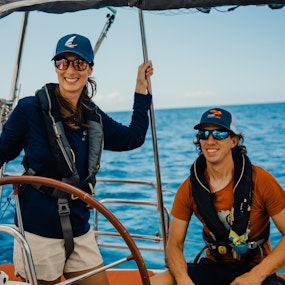
Sophie Darsy
Skipper
We are a couple of corporate rescues in our mid-thirties who after 10 years of chasing the next pay raise, quit our office jobs and abandoned the comfort of land to pursue a life of adventures at sea on our sailboat, Polar Seal. Since 2016, we have sailed about 25000 nautical miles to over 15 countries, in the Baltic Sea, around Western Europe, in the Mediterranean, the Caribbean, and across the Atlantic three times.
We are currently spending hurricane season in Bermuda until Sophie's green card is approved and we can start sailing in the United States.





































